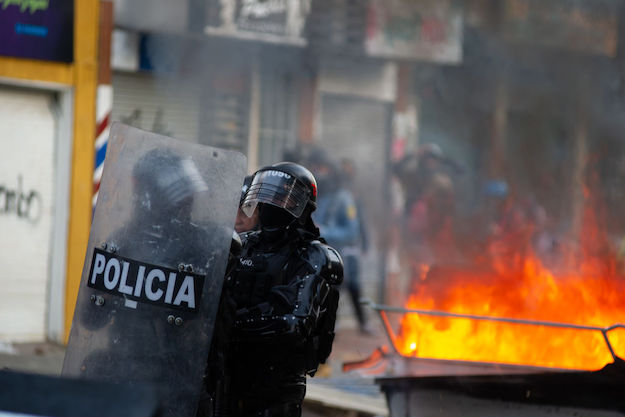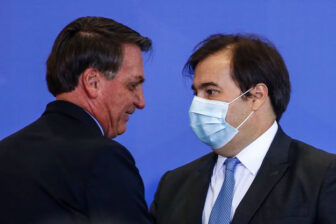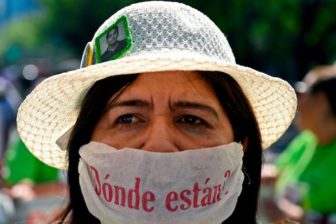It happened again on Sunday: Six young Colombians killed on a sidewalk in broad daylight, in an attack that reportedly involved rifles and grenades, in the troubled department of Cauca. There have been dozens of such mass killings nationwide this year, prompting worries about a new escalation of violence in the Colombian countryside.
Indeed, incidents of violence have regularly competed with the horror of the COVID-19 pandemic for headlines throughout 2020. The Sept. 9 death of Javier Ordóñez, a lawyer, at the hands of police who repeatedly shocked him with a stun gun as he begged “Enough, please, no more,” prompted Colombians to take to the streets en masse. Police responded brutally, leaving 13 dead and hundreds injured. Another demonstration on Monday saw thousands of Colombians demanding an end to the violence.
All the bloodshed and instability underscore the urgent need to overhaul Colombia’s security policies. The country needs a stronger civilian police force that reports to the Interior Ministry instead of the Defense Ministry, and less reliance on the military as the main representative of the Colombian state in rural areas. Such reforms won’t be easy, but they are the best chance for President Iván Duque to prevent the specter of violence, sadly never distant in Colombia, from spreading further in the country.
To be fair, in the first half of 2020, Colombia had the lowest national homicide rate in decades, thanks in large part to progress in many urban areas. The 2012-2016 peace process brought a decrease in the country’s homicides that the Duque administration was in large part able to maintain. As in many countries, the lockdown measures against COVID-19 helped drive national homicides rates down further.
But the situation in remote and rural communities across the country is different – and increasingly dire. Many have seen homicides increase. From the start of this year through mid-August, the United Nations documented at least 33 incidents of mass killings, up from 11 in all of 2017. Armed groups control many towns and neighborhoods, imposing tight rules and “punishments” on the population. Over 350 human rights defenders, including indigenous, Afro-Colombian and other community leaders, have been killed since 2017. Most of the killings occurred in rural areas where in the past, violence has often catalyzed before spreading to urban parts.
The 2017 demobilization of the Revolutionary Armed Forces of Colombia (FARC), then the country’s largest armed group, created an opportunity to reconsider the role and structure of the country’s security forces. Many Colombians envisioned a stronger civilian police force. But Duque, who took office in August 2018, insisted on retaining a largely military design.
Colombia’s police are controlled not by the Interior Ministry, as elsewhere in Latin America, but by the Defense Ministry. Partly as a result, its work is deeply entangled with the army, and the difference between training for military operations and civilian policing can manifest when officers carry out law enforcement tasks like patrolling this month’s protests with excessive force. And when the police abuse the citizens they are supposed to serve, abusers may be tried in military courts, rather than before civilian authorities.
After decades of armed conflict, many Colombians became accustomed to military activity in their streets. Some shrugged it off when Defense Minister Carlos Holmes Trujillo announced on Sept. 10 that he was sending 300 soldiers, in addition to hundreds of police, to address protests and related vandalism in Bogotá.
But if militarization of the police is a problem, so too is the excessive reliance on the military to address rural violence. The Duque government often sends the army to areas where armed groups that stepped into the breach left by the FARC are warring for control over land and engaging in illegal activities. But the strategy has often achieved little.
Indeed, deploying troops does not address the illegal economies, lack of legitimate economic opportunities, and weak state presence that allow armed groups to thrive. In remote areas across Colombia, thousands live in poverty with little access to basic public services, making it easy for armed groups to recruit. These areas have too few prosecutors, investigators, and judges, as well as police, to provide adequate protection and justice. Many rural people see armed groups as the only authority able to address crime —or even to establish measures to prevent the spread of COVID-19.
Soldiers are at times the only government presence in rural areas, and the military has, in recent years, generated multiple human rights scandals —which undermine trust in the government. General Nicacio de Jesús Martínez Espinel resigned as the army commander in December, after an outcry over his reinstatement of policies resembling those that led, a decade ago, to executions known as “false positives.” In July 2020, the army said it was looking into a 15-year-old indigenous girl’s allegation that, in August 2019, two soldiers kidnapped and raped her. The army said the authorities were investigating 118 soldiers for alleged cases of sexual abuse since 2016.
The government has not addressed these concerns seriously. It says drug trafficking is the root of all problems. In reaction to the massacres, the authorities promised to reinstate aerial fumigation of coca crops—a policy that Colombia abandoned in 2015 out of concerns over rural residents’ health. The authorities have increased other operations to eradicate coca crops as well.
Drug trafficking obviously plays a role in the violence. But the new policies miss the point. Many Colombians grow coca because it is their only profitable crop, given weak local food markets, inadequate roads, and lack of formal land titles. Eradication and fumigation do little to ensure a profitable alternative—and they further undermine trust in authorities.
For decades, authorities have been reluctant to examine the security forces, opting instead to shield high-level officials, label low-level officers involved in crimes as “rotten apples,” and continue business as usual. A commission created by Duque to review army policies and ensure their compliance with international human rights and humanitarian law was supposed to present a final report by November 2019, but it has yet to issue its findings. In February, a UN body asked the government to consider transferring the police to the Interior Ministry—as in most countries in Latin America. Duque called the recommendation an “intrusion on sovereignty.”
But after the death of Javier Ordóñez, Bogotá Mayor Claudia López broke the mold, calling for a police overhaul. Before more innocent lives are lost, national authorities should heed her, and take the opportunity to rethink the country’s security policies. “Enough, please, no more.”
__
Pappier, a lawyer, is Americas researcher at Human Rights Watch.





